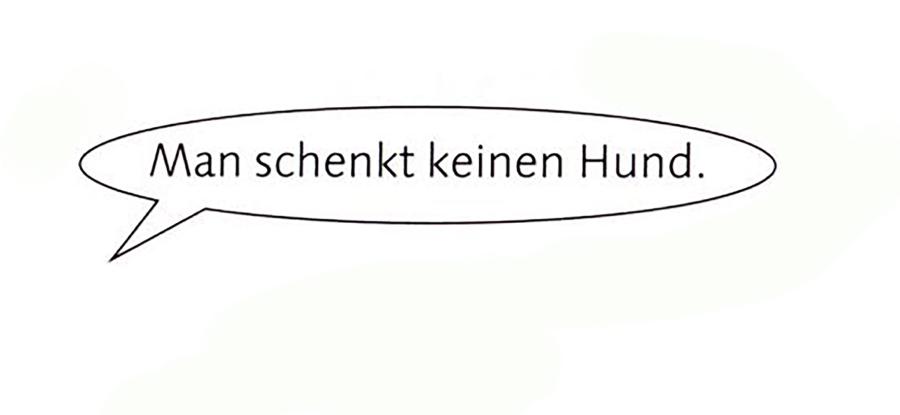Scriptings#47: "Man schenkt keinen Hund."
Sat, 10 Dec 2016 19:00at Scriptings
Scriptings#47: "Man schenkt keinen Hund."
Zandile Darko, Serge Fouha & Jelka Plate, Maria Iorio & Raphaël Cuomo, Anna Kryczyńska-Pham, Christine Lemke, Katrin Mayer, Karolin Meunier, Karen Michelsen Castañón mit Pedro Abreu Tejera, Daniela Carrasco, Katty Moreno Bravo & Mauricio Pereyra, Kınay Olcaytu Okzidentalismus-Institut, Anton Stuckardt, Romy Rüegger, Eran Schaerf, Sandra Schäfer, Jan Timme.
Initiated by Christine Lemke in collaboration with Scriptings / Achim Lengerer.
Production by Heiko Karn
With the introduction of a new national immigration law in 2005, the Federal Republic of Germany defined itself as an immigration country for the first time, moving to reform its immigration policy around the concept of “integration.” In cases where there is an “identified need for integration,” individuals can be required by immigration authorities and job centers to attend so-called “integration courses,” which since 2005 have formed the core of the federal integration program.
In contemporary debates over a “leading culture,” often invoked as an indispensable instrument of the state, the purpose of integration courses – besides teaching the German language – is to provide an opportunity for the targeted transmission of values.
The textbooks and teaching materials, their content and imagery, are created accordingly, following guidelines from the Bundesamt für Migration und Flüchtlinge (Federal Office for Migration and Refugees). In accordance with the legal duty outlined in the ministry’s “Concept for a Nationwide Integration Course,”(1) these materials attempt in various ways to provide for instruction in German culture and the acquisition of democratic values. As a result, the characters represented in the illustrations constitute an image of the “typically German.” At the same time, as a pedagogical tool for identification, the profiled immigrant target group is depicted as well, and its “non-Germanness” is established and highlighted – by specific visual attributes, for example, or by cultural/social positioning.
The title of our project, Man schenkt keinen Hund (You don’t give a dog as a present), comes from an exercise on the generic pronoun man. The object of the exercise is to discuss what gifts might be appropriate for a housewarming party in Germany. The structure of the exercise, its linking of language-learning content with a representation of seemingly universally valid behaviors, reflects an ambivalent pedagogical gesture.
Conceived as an open-ended research project, Man schenkt keinen Hund adopts various approaches and artistic/theoretical strategies in an attempt to interrogate the identitarian discourses around the concept of “integration” and to investigate the ways these discourses are manifested in the thematic, iconographic, and pedagogical presentation of teaching materials for integration courses.
How, for example, are the characters and individuals that appear in the photographs, drawings, and texts distinguished and made visible as either “immigrants” or “natives”? Which definitions of the “familiar” and the “other” are inscribed in the images, texts, and audio material? What concept of culture is operative and used to produce cultural difference? Or: How is language put in relation to identity?
An “apparatus” of materials assembled from workbooks, audio files, test materials, etc., as well as a collection of images and illustrations from German textbooks used in integration courses, forms the complex starting point for this project. All participants were asked to contribute a piece responding to the apparatus or based on the materials. The artistic, filmic, performative, and textual results will be presented by Scriptings over the space of several months, in various exhibition and event formats as well as within a publication.
(1) “The object of the integration course is to promote the integration of immigrants, thereby promoting social participation and equal opportunity. Through study of the democratic constitutional state’s culture, history, legal system, political institutions, and political values as embodied in the constitution, the course further aims to promote positive interactions between immigrants and their new environment. Good German language skills and knowledge of the legal and social system are essential tools for achieving equal participation and equal opportunity. Good language skills increase one’s chances of integration into the labor market and form the foundation for a successful educational career.”
“Concept for a Nationwide Integration Course” / Federal Office for Migration and Refugees
https://www.bamf.de/SharedDocs/Anlagen/EN/Downloads/Infothek/Integrationskurse/Kurstraeger/KonzepteLeitfaeden/konz-f-bundesw-integrationskurs.pdf?__blob=publicationFile
Kindly supported by: Hauptstadtkulturfonds and Bezirkskulturfondsmitte
Opening hours: Saturday 12-17 hours and by appointment An additional program of events, workshops, screenings in spring/summer 2017.
